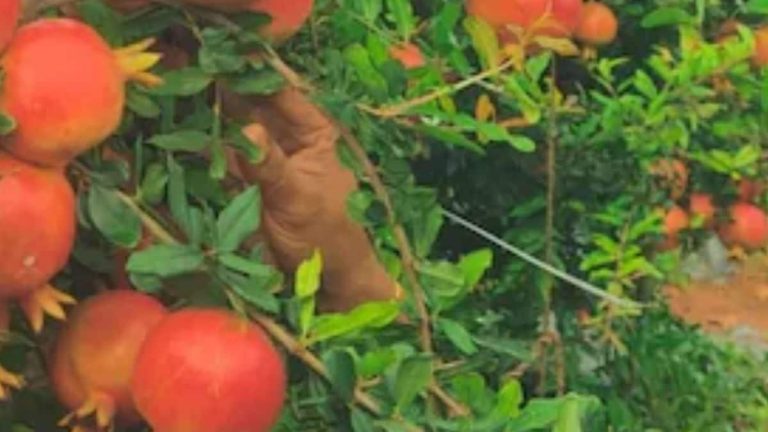Last updated:

The pomegranates are sold at Rs 160 per kg.
So far, 2,400 pomegranate plants have been planted in his field. This bumper harvest has exceeded the profit of all the plants.
A 45-year-old farmer named Ramesh from Hullehalli village in Kadur Taluk of Chikmagalur district in Karnataka is currently making headlines. According to Karnataka Local 18 newspaper, he spent Rs 20 lakh to grow pomegranate crops on 8 acres of land. When Ramesh sold the bumper crop in the market, he earned Rs 95 lakh. This is a major achievement for Ramesh as Hullehalli village has been suffering from drought since 2023. So far, 2,400 pomegranate plants have been planted in his field. This bumper harvest has exceeded the profit of all the plants. Farmers of Hullehalli village said coffee and pomegranates are being exported to Tamil Nadu, Bengaluru, Chennai, Maharashtra, Sri Lanka and Bengal. Pomegranates grown by Ramesh are sold at Rs 160 per kg. In Hullehalli and other neighboring villages, few people grow pomegranates, but no one benefits as much as Ramesh. They all suffered agricultural losses.
More information about pomegranate growing
According to Niche Agriculture, pomegranate cultivation is an important agricultural practice in India. This is because India is one of the largest pomegranate producers in the world. The profitability of pomegranate farming in India depends on many factors. Profitability is driven by factors such as soil quality, climate, farming methods and market demand.
There are several advantages to growing pomegranates, including:
1. High demand: Pomegranate is a popular fruit with increasing demand in domestic and foreign markets. This makes it a profitable crop.
2. Long shelf life: Pomegranates have a long shelf life, which means they can be stored and sold for a longer period of time.
3. Nutritional value: Pomegranate is rich in vitamins, minerals and antioxidants, making it a nutritious food choice. This also increases the marketability of the fruit.
4. Low Maintenance: Pomegranate trees are relatively low maintenance, requiring less water and fertilizer than many other fruit trees.
5. Drought tolerance: Pomegranate trees are drought tolerant and suitable for planting in areas with limited water resources.
